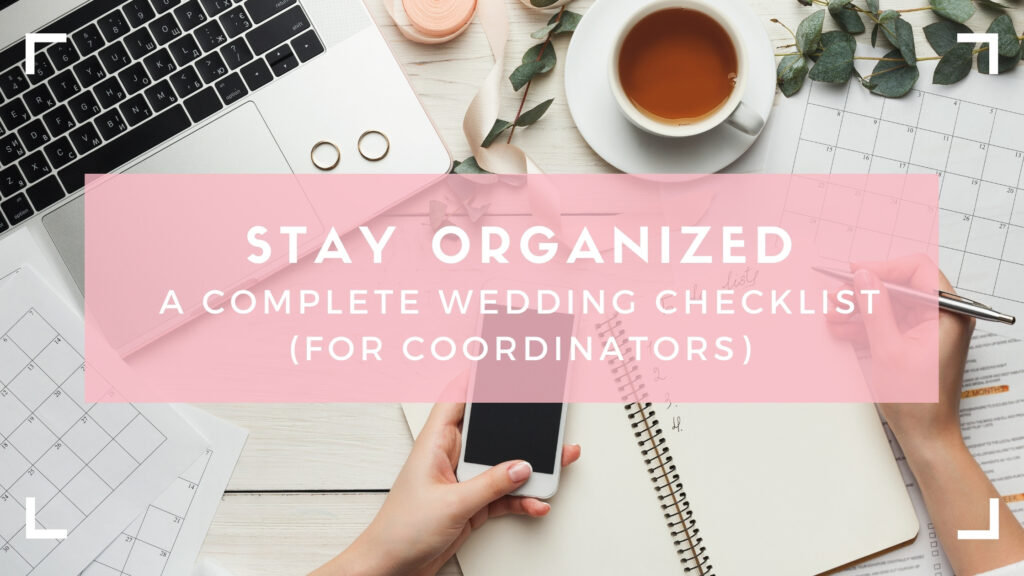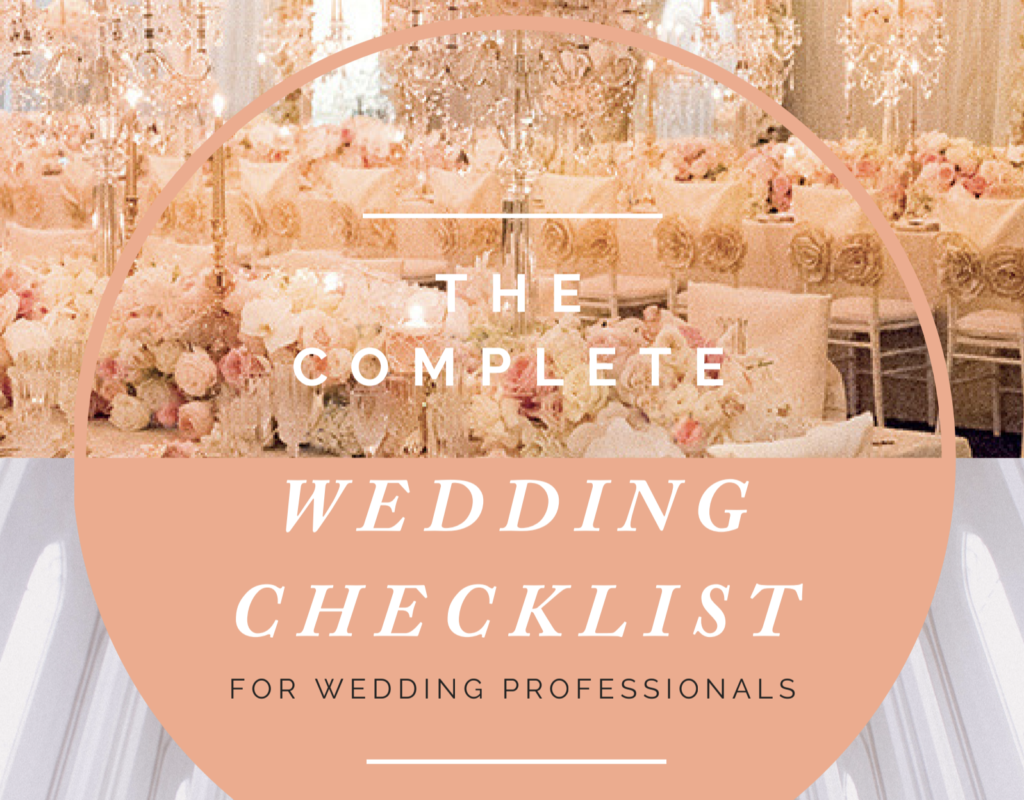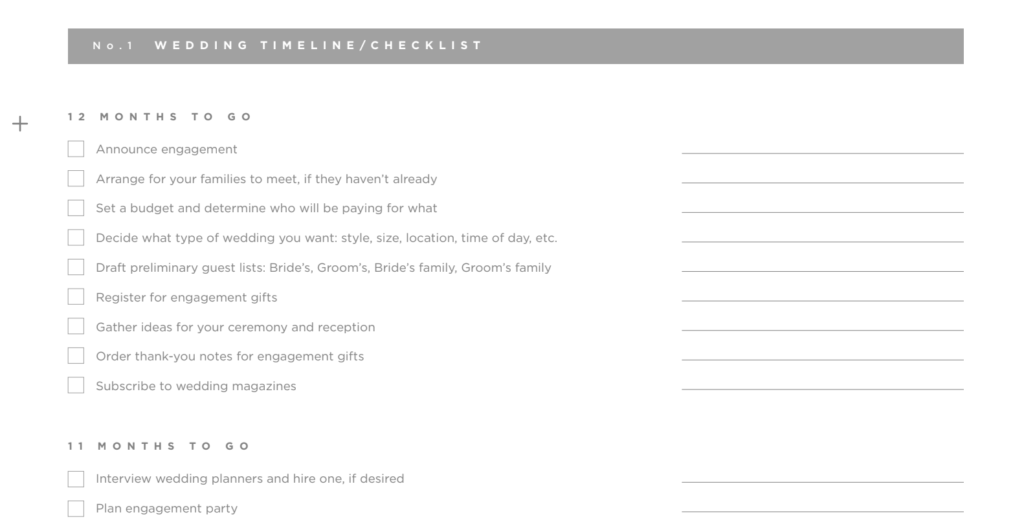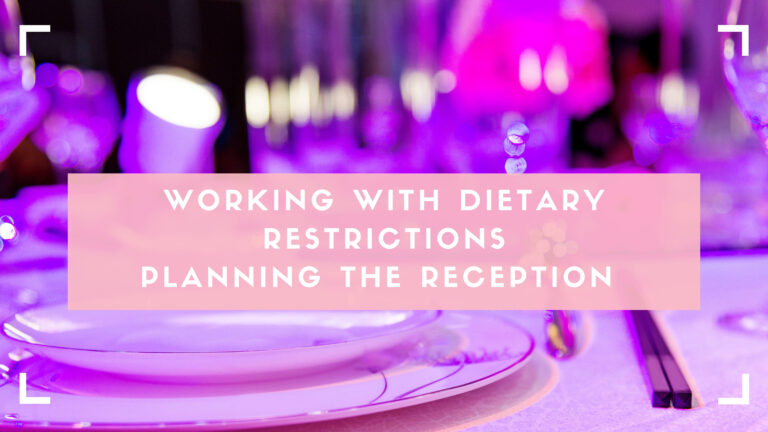Saying “yes!” was the easy part. A couple deciding what kind of wedding they want to have —gets a little more complicated. That’s why a wedding checklist is essential to planning success.
First a couple decides what style of wedding they envision. Then, they set how many guests they’d like to welcome. Finally, what kind of budget they have to work with. Once these are in place, you can start taking an active approach to planning a wedding that reflects who your clients are as a couple and how they want to celebrate.
Planning a wedding can be an overwhelming process, which is why they’ve turned to you. Wedding planners assume various roles throughout the planning process: manager, negotiator and, many times, therapist.
Much like an orchestra conductor, a wedding planner’s role includes keeping all components working together harmoniously. Having the tools in place to execute this vision in a timely fashion, like this wedding planner checklist, will ensure everything runs according to schedule and promise a smooth process from start to finish.
The average length of an engagement is 15 months, but as you work with clients, you’ll soon realize that this number can vary greatly. Ideally, you’ll be hired early on in the wedding process, though that’s not always the case. Our wedding checklist serves as a helpful guideline no matter when you connect with your couple.
12 Months Out
There are a number of factors that impact the three most determining wedding planning elements: head count, venue, and budget.
Create Guest Lists and Determine the Budget.
Guest count and budget are interdependent; therefore, couples can make a “a list” of people they could not imagine getting married without, followed by a “b list” of people they would like to invite if budget and venue space allows.
When it comes to determining the budget, the couple needs to know what costs they will be responsible for covering and if any other people, like parents for example, will be contributing.
Select a Venue.
Where the couple wants to celebrate their wedding will determine next steps and the ensuing timeline. Weddings in popular destinations often book a year or even two years out, meaning venue availability is limited. If your couple has their heart set on such a location, there’s no such thing as booking a venue too early.
Decide on a Theme or Wedding Vibe.
Start talking to your clients about how they envision the look and feel of their wedding. While some venues serve as a blank canvas, other venues, including historic attractions, museums, ballrooms and barns, set a very specific tone.
Before signing on the dotted line, be sure to talk to your clients about a venue’s cancellation policy. The contract may specify a non-refundable deposit should the wedding be cancelled or moved to another date. Knowing the policies of differing venues is an advantage as a wedding planner.
11 Months Out
When should couples begin booking vendors? Much like their venue, as soon as possible. But, 11 months out is a good measure. While they may not need to get into detail with vendors this far out—for example, providing song requests or photo favorites—they do need to lock them in, especially the most sought after.
Start Booking Key Vendors.
Couples should start by prioritizing: Are photos and videos most important? What about entertainment? Are they leaning toward a band or DJ? If their venue doesn’t offer on-site catering, now is the time to book a caterer. So, where to begin?
Book Catering and Make a Menu.
Since catering (food and beverage) accounts for around 40 percent of a wedding budget, start here. Caterers can provide a variety of dining options based on budget. As a step on your wedding checklist, make sure your clients are accounting for the total catering spend: food, beverage, service, gratuity, taxes, and fees. Unexpected costs can put a wedding budget in a tailspin, so knowing total costs from the outset will serve them well and make the remainder of your wedding planning realistic.
Book the Photographer and Videographer.
For many couples, documenting the day ranks among their top priorities. Book photographers and videographers as soon as possible—ideally those who are familiar with the venue so they know all of the best angles.
Insider’s tip: if your clients are exchanging vows in a religious ceremony, it is imperative they understand the rules and regulations of that house of worship. For example, some churches prohibit photographers from sacred spaces during the wedding ceremony, but they may permit photos afterward. Learning what the protocol is will allow you to create an accurate timeline so the day flows seamlessly.
10 Months Out
Imagine trying to find something to wear for the most photographed day of your life. Yes, it’s a lot of pressure. While everyone loves the pics of family members donning powder blue tuxedos, today’s couples are typically looking for timeless ensembles.
Purchase Wedding Day Attire.
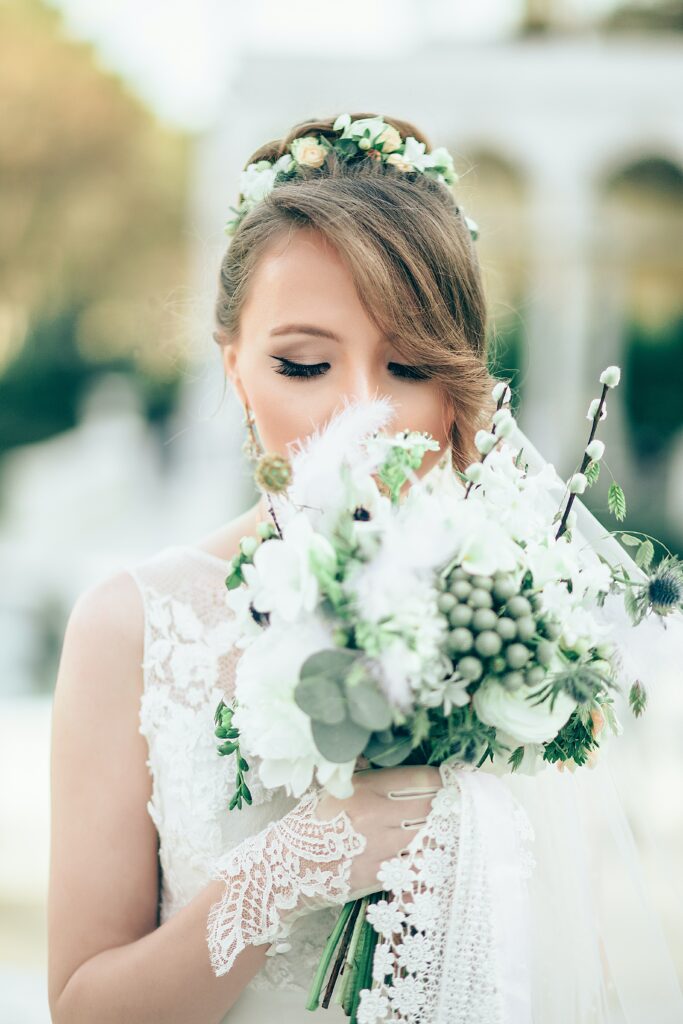
Your clients may look to you for resources as well as a realistic timeline for ordering clothing and accounting for alterations. Wedding dresses made overseas could face unforeseen shipping delays, while a bespoke suit can take up to 12 weeks sans shipping.
Ideally, attire is one of the most fun parts of the planning process, but shipping and alterations can take considerable time.. While they may not need their wedding planner on-site for saying yes to the dress, stay in contact regarding arrivals and seamstress appointments.
Book a Florist.
Make sure your couple considers all floral needs including ceremony florals, bouquets, butioneers, corsages for grandparents/parents, and of course, table centerpieces.
If eschewing a florist for a DIY centerpiece, you may be expected to assist or direct whomever will be overseeing assembly of these on wedding day. Ensure the wedding day itinerary dedicates time for this and that the venue is accessible and accommodating.
9 Months Out
The date is set. It’s all coming together. Now is the time for your couple to go public – the following are the next steps on your wedding checklist.
Create and Order Save the Dates.
Save the dates can be as elaborate as a message in a bottle or as simple as a text message. The functionality is the same: Let guests know the wedding date so they can put it in their already filling calendar.
Insider’s tip: Save the dates are especially important for weddings where a good percentage of guests will have to travel (note: be sure to arrange room blocks in local hotels) as well as weddings during popular times of year including during the summer and over holiday weekends.
Build a Wedding Website.
As some guests might need to make travel arrangements, creating a wedding website (playfully referred to oftentimes as a “wedsite”) with all of your event’s pertinent information is especially helpful.
Be sure to include the essentials:
- Date
- Ceremony location, address, and start time
- Cocktail hour location, address, and start time
- Wedding weekend itinerary
- Parking information if necessary
- Registry information
- Lodging/room block information
Additional critical information includes transportation details if being provided and wedding-related event info such as rehearsal dinner and/or next day brunch information.
Wedding Party Should Order Dresses and Suits.
If not shopping off the rack, bridesmaids should be measured and have their ensembles ordered around this time. The groom(s) should be sure groomsmen attire is ordered or purchased. Tuxedo rentals don’t need as much advance booking time; however, inventory can be limited, so booking early has its benefits.
Finalize Ceremony-Related Vendors and Details.
This is an ideal time to firm up ceremony musicians and, if necessary, an officiant. Should the couple choose to be married by a friend or family member, be sure they’ve completed any required legal paperwork/applications.
Order Invitations.
Couples should have their invites selected, drafted, and ordered between eight and nine months. While it can be pushed as long as five to six months out, allowing adequate time for printing and shipping will reduce any undue stress and give extra time should there be an error.
6 Months Out
Ready, set, register. While a gift registry isn’t something you need to be present for, it’s important to know where your clients are registered and ensure they’ve completed the registration process.
This is also a good time to circle back on the progress of wedding dress/suits/tux orders. While no one anticipates a major delay, no one anticipated a global pandemic that froze manufacturing for a considerable amount of time either. Experienced wedding planners can attest to this mantra: Hope for the best, plan for the worst.
Book the Rehearsal Dinner Location.
The rehearsal and rehearsal dinner location, details, and invitation should be squared away at this time. If marrying in a house of worship, chances are there is a predetermined time set aside for wedding rehearsals, typically a day before the wedding. This will determine the start time of your clients’ rehearsal dinner – add this to the wedding checklist!
Rehearsal dinner venues vary greatly, from formal event spaces to private rooms at restaurants to relaxed backyard gatherings. Popular venues should be booked no less than six months out, and this is a good time to book private rooms at restaurants as well.
For at-home rehearsals and rehearsals at venues that do not provide catering, be sure the couple has food and beverage, entertainment, or other vendors in place. As a wedding planner, it is helpful to have a dedicated itinerary and timeline for rehearsal-rated events. Allow time for dining, toasts, and gift-giving.
Confirm Rentals.
Book any necessary wedding rentals, including table linens, chairs, place settings, etc. Outside vendors including ice cream trucks, mobile bars, food trucks, photo booths, etc. should be confirmed (before doing so, be sure “extras” like these are venue-approved and that you know when they are supposed to arrive and where they are supposed to park/set-up at the wedding).
3 to 4 Months Out

Almost to the home stretch. Final tastings including catering and cake usually take place around this time. Once completed, menus can be finalized and printed.
Purchase Wedding Bands.
If your couple plans on having their wedding bands engraved, now is the time to make sure they’ve purchased them. If not engraving, they can purchase their bling closer to the big day.
Have Hair and Makeup Trials.
These vendors can be booked as far as a year out, but the trials are just a few months out from the big day.
1 to 2 Months Out
Mail Invitations.
Six to eight weeks is the ideal window to mail wedding invitations, but be sure your clients know to take into consideration the time it will take to assemble, address, and apply accurate postage—and to account for any mailing delays to your guests.
Assemble Welcome Bags.
If providing welcome bags to guests staying at hotels, this is a great time to purchase all the contents, fill the bags, and organize them according to lodging property. Pro tip: Some hotels charge a fee to distribute guest bags. Be sure your clients prepare accordingly.
Print Programs.
Finalize the ceremony details including program, readings, song selections, and vows. Confirm the officiant has everything they need. Most officiants will not attend the wedding unless they are particularly close to the couple, but it’s courteous to extend an invitation.
Make Final Payments.
Review all vendor agreements closely. Some require final payments before the big day. Prepare and label gratuity envelopes to have ready on the wedding day to distribute.
Choose Wedding Dances and Special Songs.
The couple’s band or DJ will be requesting special songs including entrance songs, the first dance, parent dances, wedding party dances and for the dance floor, your favorite songs.
Secure the Marriage License.
This is the most critical piece to your wedding checklist! State rules and regulations regarding wedding licences vary. Be sure your couple has all the documentation required to apply for the license in the city, town, or county where they plan to marry and that they do not secure the license too far in advance. In most states, a marriage license is only valid for a specific period from the time it is issued.
1 Week Out:You Are Almost at the Finish Line!
By now, wedding day attire (and all other wardrobe needs including outfits for the rehearsal dinner, after party, etc.) should be ready.
Complete Table Assignments and Seating Cards.
Place cards or the table assignment display can be finalized as those last-minute guest changes come in (sadly, it’s inevitable).
Drop Off Venue Essentials.
Wedding day accessories that need to be on-site at the venue, including the guest book, toasting flutes, the cake knife and cake stand, plus guest amenities like flip flops or wraps for women to stay warm, are usually dropped off the day before the wedding. Confirm a time and drop-off location with the venue in advance.
Ease and Organization with a Wedding Checklist
There are a lot of layers to planning a wedding and even more moving parts. While at first glance it may seem daunting, accomplishing tasks in small steps amounts to big accomplishments. Refer to this wedding checklist continually to be sure you’re on track, having fun and remain stress free.


